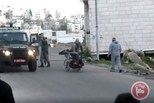14 feb 2016
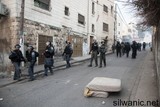
The Musta’ribeen unit arrested on Friday one child and a young man from the village of Esawyeh.
Mohammad Abu Hummos, member of follow-up committee in the village of Esawyeh, explained that clashes broke out between young men and occupation forces around the neighborhoods of Abu Rayaleh and Dari in the village in which occupation forces used rubber bullets and sound grenades.
Abu Hummos added that the Musta’ribeen unit raided the area of clashes and arrested one child and one young man. During the arrest operation, they heavily fired live bullets to prevent anybody from approaching them.
Lawyer Mohammad Mahmoud explained that the detainees were identified as 13-year old Abdullah Abu Khati and 18-year old Mahmoud Abu Aweis.
Mohammad Abu Hummos, member of follow-up committee in the village of Esawyeh, explained that clashes broke out between young men and occupation forces around the neighborhoods of Abu Rayaleh and Dari in the village in which occupation forces used rubber bullets and sound grenades.
Abu Hummos added that the Musta’ribeen unit raided the area of clashes and arrested one child and one young man. During the arrest operation, they heavily fired live bullets to prevent anybody from approaching them.
Lawyer Mohammad Mahmoud explained that the detainees were identified as 13-year old Abdullah Abu Khati and 18-year old Mahmoud Abu Aweis.
Israeli media reported that no Israelis were injured during the incident. The 14-year-old was identified as Yasmin Rashad al-Zarou. She was evacuated from the scene by Israeli forces.
Minutes after the attack, a graphic video of the injured girl surfaced on social media.
Hours earlier, Israeli forces shot and killed a 17-year-old Palestinian after the teen allegedly attempted to stab an Israeli soldier at a checkpoint north of Bethlehem, official Palestinian sources said.
The Palestinian Ministry of Health identified the teen as as Naim Ahmad Yousif Safi from the town of al-Ubediya, just east of Bethlehem.
Israeli police spokesman Micky Rosenfeld initially told Ma’an that a young Palestinian man approached the Mazmoria checkpoint near the illegal Israeli settlement of Har Homa and took out a knife.
Spotting the knife, Israeli soldiers shot at Safi, Rosenfeld said.
It was unclear whether the teen died on site or later as a result of his wounds.
Earlier on Sunday, Israeli forces shot and killed two 15-year-old Palestinian teenagers in the northern West Bank after the two allegedly opened fire at Israeli soldiers, an Israeli army spokesperson told Ma'an.
The spokesperson said the two teens were shot and killed after allegedly shooting at Israeli soldiers near the village of al-Araqa west of Jenin.
The spokesperson added that no Israeli soldiers were injured.
The Ministry of Health identified the deceased Palestinians as Nihad Raed Muhammad Waqed and Fuad Marwan Khalid Waqed, both 15-year-olds from al-Araqa.
On Saturday, an 18-year-old Palestinian woman identified as Kilzar al-Uweiwi was shot and killed near Ibrahimi Mosque, where Sunday's most recent attack took place.
The checkpoint near the Ibrahimi Mosque is located in Hebron's Old City, which has been designated as a "closed military zone" by the Israeli army since November.
Palestinian residents of the area have had to register under a number system in order to pass through the Old City's nearly 20 military checkpoints, and locals have reported heavier restrictions imposed by the army that Israeli rights group B'Tselem has referred to as "draconian measures."
Over 170 Palestinians have been killed by Israeli forces and settlers since a wave of unrest spread across the occupied Palestinian territory in October.
The unrest has been marked by a surge of small-scale attacks carried out by Palestinian individuals -- predominantly on Israeli military targets -- which have left over 25 Israelis dead, with the majority of suspected Palestinian attackers shot dead on site.
UN Secretary-General Ban Ki-moon last month said that it was “human nature” for Palestinians to react violently to Israel’s decades-long military occupation, and urged change in Israel’s policies in the occupied area.
Minutes after the attack, a graphic video of the injured girl surfaced on social media.
Hours earlier, Israeli forces shot and killed a 17-year-old Palestinian after the teen allegedly attempted to stab an Israeli soldier at a checkpoint north of Bethlehem, official Palestinian sources said.
The Palestinian Ministry of Health identified the teen as as Naim Ahmad Yousif Safi from the town of al-Ubediya, just east of Bethlehem.
Israeli police spokesman Micky Rosenfeld initially told Ma’an that a young Palestinian man approached the Mazmoria checkpoint near the illegal Israeli settlement of Har Homa and took out a knife.
Spotting the knife, Israeli soldiers shot at Safi, Rosenfeld said.
It was unclear whether the teen died on site or later as a result of his wounds.
Earlier on Sunday, Israeli forces shot and killed two 15-year-old Palestinian teenagers in the northern West Bank after the two allegedly opened fire at Israeli soldiers, an Israeli army spokesperson told Ma'an.
The spokesperson said the two teens were shot and killed after allegedly shooting at Israeli soldiers near the village of al-Araqa west of Jenin.
The spokesperson added that no Israeli soldiers were injured.
The Ministry of Health identified the deceased Palestinians as Nihad Raed Muhammad Waqed and Fuad Marwan Khalid Waqed, both 15-year-olds from al-Araqa.
On Saturday, an 18-year-old Palestinian woman identified as Kilzar al-Uweiwi was shot and killed near Ibrahimi Mosque, where Sunday's most recent attack took place.
The checkpoint near the Ibrahimi Mosque is located in Hebron's Old City, which has been designated as a "closed military zone" by the Israeli army since November.
Palestinian residents of the area have had to register under a number system in order to pass through the Old City's nearly 20 military checkpoints, and locals have reported heavier restrictions imposed by the army that Israeli rights group B'Tselem has referred to as "draconian measures."
Over 170 Palestinians have been killed by Israeli forces and settlers since a wave of unrest spread across the occupied Palestinian territory in October.
The unrest has been marked by a surge of small-scale attacks carried out by Palestinian individuals -- predominantly on Israeli military targets -- which have left over 25 Israelis dead, with the majority of suspected Palestinian attackers shot dead on site.
UN Secretary-General Ban Ki-moon last month said that it was “human nature” for Palestinians to react violently to Israel’s decades-long military occupation, and urged change in Israel’s policies in the occupied area.

Three Israeli soldiers along with three Palestinians were injured Saturday evening in a car-ramming incident near Ma'aleh Adomim settlement to the east of Occupied Jerusalem.
Israeli Channel Ten revealed that Israeli troops opened their gunfire at three Palestinian youths moderately injuring them.
The spokeswoman of the Israeli police, Luba al-Sumri, affirmed the injury of three soldiers in the incident and said large numbers of Israeli security forces rushed to the scene and started investigation into the incident. She described the injury of the three troops as minor and affirmed the news on the injury and arrest of the three Palestinians.
Later on, the Israeli Channel Ten said that the injuries of the soldiers resulted from a car accident as the driver of the Palestinian car did not stop leading to collision with an Israeli military jeep after which the soldiers opened fire at the Palestinian car.
Israeli Channel Ten revealed that Israeli troops opened their gunfire at three Palestinian youths moderately injuring them.
The spokeswoman of the Israeli police, Luba al-Sumri, affirmed the injury of three soldiers in the incident and said large numbers of Israeli security forces rushed to the scene and started investigation into the incident. She described the injury of the three troops as minor and affirmed the news on the injury and arrest of the three Palestinians.
Later on, the Israeli Channel Ten said that the injuries of the soldiers resulted from a car accident as the driver of the Palestinian car did not stop leading to collision with an Israeli military jeep after which the soldiers opened fire at the Palestinian car.
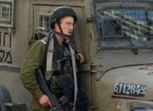
Israeli soldiers invaded, on Sunday a dawn, a number of Palestinian communities in different part of the West Bank district of Bethlehem, and kidnapped five Palestinians. The army also kidnapped two Palestinians from Jenin and Hebron.
Local sources in Deheishe refugee camp, south of Bethlehem, said several armored Israeli military vehicles invaded it, searched homes and kidnapped two Palestinians, identified as Saleh Qassem al-Masri, 22, and Ammar Sami Jahajra, 35.
Clashes took place in the refugee camp after the soldiers invaded it; the army fired several concussion grenades and gas bombs; no injuries were reported.
The soldiers also invaded the al-‘Obeyyat area, east of Bethlehem, searched homes, and kidnapped Saddam Hussein al-'Obeyyat.
Two other Palestinians, identified as Ezzeddin Samih Thawabta, and Rezeq Waleed Thawabta, were kidnapped after the soldiers invaded their home in the al-Khader town, south of Bethlehem.
In addition, the soldiers invaded Arraba town, southwest of the northern West Bank city of Jenin, searched a few homes and kidnapped a young man, identified as Wael Salman Sha’er, 19.
Also, the soldiers kidnapped Jalal Qassem ar-Ra’ey, 40, while crossing the “Container” roadblock, southeast of Jerusalem, and took him to an unknown destination.
The Palestinian, from Beit Ummar town, north of Hebron, is a former political prisoner who was imprisoned by Israel to 14 years.
Several military vehicles also invaded Beit Ummar and summoned, Ahmad Yousef Ekhlayyel, 30, for interrogation in the Etzion military and security base.
On Saturday at night, the soldiers kidnapped Mohammad Hosni Bani Odeh, from Tammoun town, near Jenin, after stopping him on the Za’tara military roadblock, south of the northern West Bank city of Nablus.
The soldiers also blockaded with sand mounds the main road, leading to Aqraba nearby town, southeast of Nablus, only five days after the soldiers opened the road by removing the sand hills.
Local sources in Deheishe refugee camp, south of Bethlehem, said several armored Israeli military vehicles invaded it, searched homes and kidnapped two Palestinians, identified as Saleh Qassem al-Masri, 22, and Ammar Sami Jahajra, 35.
Clashes took place in the refugee camp after the soldiers invaded it; the army fired several concussion grenades and gas bombs; no injuries were reported.
The soldiers also invaded the al-‘Obeyyat area, east of Bethlehem, searched homes, and kidnapped Saddam Hussein al-'Obeyyat.
Two other Palestinians, identified as Ezzeddin Samih Thawabta, and Rezeq Waleed Thawabta, were kidnapped after the soldiers invaded their home in the al-Khader town, south of Bethlehem.
In addition, the soldiers invaded Arraba town, southwest of the northern West Bank city of Jenin, searched a few homes and kidnapped a young man, identified as Wael Salman Sha’er, 19.
Also, the soldiers kidnapped Jalal Qassem ar-Ra’ey, 40, while crossing the “Container” roadblock, southeast of Jerusalem, and took him to an unknown destination.
The Palestinian, from Beit Ummar town, north of Hebron, is a former political prisoner who was imprisoned by Israel to 14 years.
Several military vehicles also invaded Beit Ummar and summoned, Ahmad Yousef Ekhlayyel, 30, for interrogation in the Etzion military and security base.
On Saturday at night, the soldiers kidnapped Mohammad Hosni Bani Odeh, from Tammoun town, near Jenin, after stopping him on the Za’tara military roadblock, south of the northern West Bank city of Nablus.
The soldiers also blockaded with sand mounds the main road, leading to Aqraba nearby town, southeast of Nablus, only five days after the soldiers opened the road by removing the sand hills.
13 feb 2016

Israeli Navy Forces opened fire Saturday morning at Palestinian fishing boats off Gaza shores.
No casualties were reported during the armed attack. Quds Press quoted local sources as saying that Israeli war boats deliberately targeted this morning a number of Palestinian fishing boats while sailing off Gaza shores.
There were no reports on casualties; however, the fishermen were forced to abandon their boats and return to shore.
Under a ceasefire agreement following a deadly 51-day Israeli war on Gaza in August 2014, Israel agreed to expand the fishing zone off Gaza’s coast, allowing fishermen to sail as far as six nautical miles off the shore.
Palestinian fishermen, however, are usually targeted by the Israeli navy before they reach the agreed limit. The Gaza Strip has been under Israel’s blockade since June 2007.
The blockade has caused a decline in living standards as well as unprecedented levels of unemployment and unrelenting poverty. Around 4,000 fishermen work in Gaza, with more than half of them living below the poverty line.
Israel Continues to Breach Ceasefire by Targeting Gaza Fishermen
Israeli naval boats, on Saturday, continued to breach a truce agreement reached in August of 2014, under Egyptian auspices, opening heavy machine gunfire on Palestinian fishermen offshore, in the north of the Gaza Strip.
According to WAFA, the navy fired on the fishermen despite their sailing within the unilaterally imposed 6-nautical mile fishing zone, forcing farmers to flee back to shore, for fear of being injured, killed, or arrested.
The Israeli navy targets Palestinian fishermen and farmlands along the border on an almost daily basis, in a blatant breach of the August 2014 truce agreement reached between the Israeli side and Palestinian armed resistance in Gaza, following 51 days of bloody aggression on the Strip.
The aggression claimed the lives of over 2,200 Palestinians -- mostly civilians, including some 551 children -- and left more than 10,000 others injured.
Archive IMEMC video: Gaza City's Devastated Al-Shuja'eyya Suburb
According to a press release issued in December of 2015, al-Mezan Center for Human Rights said that Israeli occupation forces have escalated their attacks against Palestinian fishermen off of the coast of Gaza amidst the ongoing siege, through which Israel prevents the entry of fishing equipment vital for the survival of the fishing community.
“Fishermen in Gaza are being deprived of their basic right to work, amidst violations of international humanitarian law and human rights law.”
According to al-Mezan's monitoring, since the beginning of 2015 and until the publishing of the release, Israeli forces 'killed one fisherman, injured 17, and arrested 63... confiscated 19 fishing boats, destroyed fishing equipment on 12 occasions, and opened fire on Palestinian fishermen in 118 incidents during the same period.’
In line with the 1993 Oslo Accords, Palestinian fishermen are entitled to 20 nautical miles of fishing grounds; however, Israel restricts the fishermen to six nautical miles or less, where the catch is almost completely diminished and the fishermen are barely able to work.
“The restriction is a clear violation of the fishermen’s right to work and to access land and natural resources.”
The center noted that Israeli authorities continue to prevent the entry of fishing equipment into Gaza, including engines and fiberglass used to make boats. This restriction has an enormous impact on the ability of the fishing community to survive with the deteriorating standards of living and increasing poverty and unemployment.
In September, the United Nations warned that that the Gaza Strip could become uninhabitable for residents within just five years, pointing to the devastation of war and nearly a decade of Israeli blockade.
Al Mezan strongly condemned 'Israel’s ongoing siege imposed on the Gaza Strip and the continued and systematic attacks against Palestinian fishermen that include death and injury, arrest and ill-treatment.’
In addition, the group condemned the Israeli damage, destruction and confiscation of Palestinian fishing equipment and boats, which represent their only source of income.
It reiterated its call on the international community “to promptly intervene to uphold its legal obligations towards civilians in the oPt and to respect its obligations under international law to investigate and prosecute perpetrators of gross violations of international humanitarian law.”
“Israel’s attacks against Palestinian fishermen, who do not pose any threat to Israeli soldiers, in the Gaza Strip constitute a flagrant violation of international humanitarian and human rights law, relevant to the protection of the civilian population and respect for its rights, including every person’s right to work, and the right to life, liberty and security of person, as codified in Article 3 of the Universal Declaration of Human Rights and Article 6 of the International Covenant on Civil and Political Rights (ICCPR), despite the fact that Israel is a State Party to the Covenant,” said the Palestinian Center for Human Rights (PCHR).
In June 2007, following the takeover of Gaza by Hamas, Israel imposed a land, sea and air blockade on the Gaza Strip.
According to a World Bank report issued on May 2015, “The blockade has reduced Gaza’s GDP by 50%.”
According to OCHA report titled: The Humanitarian Impact of the Blockade, “Israel, as the occupying power, must lift the blockade, which prevents the realization of a broad range of human rights for Palestinians in Gaza. The Secretary General of the United Nations has stated that the blockade and its related restrictions contravene article 33 of the Geneva Convention IV prohibiting collective penalties.”
No casualties were reported during the armed attack. Quds Press quoted local sources as saying that Israeli war boats deliberately targeted this morning a number of Palestinian fishing boats while sailing off Gaza shores.
There were no reports on casualties; however, the fishermen were forced to abandon their boats and return to shore.
Under a ceasefire agreement following a deadly 51-day Israeli war on Gaza in August 2014, Israel agreed to expand the fishing zone off Gaza’s coast, allowing fishermen to sail as far as six nautical miles off the shore.
Palestinian fishermen, however, are usually targeted by the Israeli navy before they reach the agreed limit. The Gaza Strip has been under Israel’s blockade since June 2007.
The blockade has caused a decline in living standards as well as unprecedented levels of unemployment and unrelenting poverty. Around 4,000 fishermen work in Gaza, with more than half of them living below the poverty line.
Israel Continues to Breach Ceasefire by Targeting Gaza Fishermen
Israeli naval boats, on Saturday, continued to breach a truce agreement reached in August of 2014, under Egyptian auspices, opening heavy machine gunfire on Palestinian fishermen offshore, in the north of the Gaza Strip.
According to WAFA, the navy fired on the fishermen despite their sailing within the unilaterally imposed 6-nautical mile fishing zone, forcing farmers to flee back to shore, for fear of being injured, killed, or arrested.
The Israeli navy targets Palestinian fishermen and farmlands along the border on an almost daily basis, in a blatant breach of the August 2014 truce agreement reached between the Israeli side and Palestinian armed resistance in Gaza, following 51 days of bloody aggression on the Strip.
The aggression claimed the lives of over 2,200 Palestinians -- mostly civilians, including some 551 children -- and left more than 10,000 others injured.
Archive IMEMC video: Gaza City's Devastated Al-Shuja'eyya Suburb
According to a press release issued in December of 2015, al-Mezan Center for Human Rights said that Israeli occupation forces have escalated their attacks against Palestinian fishermen off of the coast of Gaza amidst the ongoing siege, through which Israel prevents the entry of fishing equipment vital for the survival of the fishing community.
“Fishermen in Gaza are being deprived of their basic right to work, amidst violations of international humanitarian law and human rights law.”
According to al-Mezan's monitoring, since the beginning of 2015 and until the publishing of the release, Israeli forces 'killed one fisherman, injured 17, and arrested 63... confiscated 19 fishing boats, destroyed fishing equipment on 12 occasions, and opened fire on Palestinian fishermen in 118 incidents during the same period.’
In line with the 1993 Oslo Accords, Palestinian fishermen are entitled to 20 nautical miles of fishing grounds; however, Israel restricts the fishermen to six nautical miles or less, where the catch is almost completely diminished and the fishermen are barely able to work.
“The restriction is a clear violation of the fishermen’s right to work and to access land and natural resources.”
The center noted that Israeli authorities continue to prevent the entry of fishing equipment into Gaza, including engines and fiberglass used to make boats. This restriction has an enormous impact on the ability of the fishing community to survive with the deteriorating standards of living and increasing poverty and unemployment.
In September, the United Nations warned that that the Gaza Strip could become uninhabitable for residents within just five years, pointing to the devastation of war and nearly a decade of Israeli blockade.
Al Mezan strongly condemned 'Israel’s ongoing siege imposed on the Gaza Strip and the continued and systematic attacks against Palestinian fishermen that include death and injury, arrest and ill-treatment.’
In addition, the group condemned the Israeli damage, destruction and confiscation of Palestinian fishing equipment and boats, which represent their only source of income.
It reiterated its call on the international community “to promptly intervene to uphold its legal obligations towards civilians in the oPt and to respect its obligations under international law to investigate and prosecute perpetrators of gross violations of international humanitarian law.”
“Israel’s attacks against Palestinian fishermen, who do not pose any threat to Israeli soldiers, in the Gaza Strip constitute a flagrant violation of international humanitarian and human rights law, relevant to the protection of the civilian population and respect for its rights, including every person’s right to work, and the right to life, liberty and security of person, as codified in Article 3 of the Universal Declaration of Human Rights and Article 6 of the International Covenant on Civil and Political Rights (ICCPR), despite the fact that Israel is a State Party to the Covenant,” said the Palestinian Center for Human Rights (PCHR).
In June 2007, following the takeover of Gaza by Hamas, Israel imposed a land, sea and air blockade on the Gaza Strip.
According to a World Bank report issued on May 2015, “The blockade has reduced Gaza’s GDP by 50%.”
According to OCHA report titled: The Humanitarian Impact of the Blockade, “Israel, as the occupying power, must lift the blockade, which prevents the realization of a broad range of human rights for Palestinians in Gaza. The Secretary General of the United Nations has stated that the blockade and its related restrictions contravene article 33 of the Geneva Convention IV prohibiting collective penalties.”
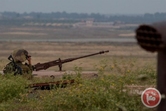
Israeli forces opened fire on Palestinian farmers east of al-Buriej refugee camp, in the central Gaza Strip, on Friday afternoon, locals said.
The farmers were forces to leave the area, with no injuries reported.
Meanwhile, locals said that four Palestinians were reportedly detained after crossing the border fence between the besieged enclave and Israel.
An Israeli army spokesperson said she was "looking into the reports", according to Ma'an.
Palestinians frequently face fire from Israeli forces inside of or near the military-imposed “buffer zone” along the borderline between Gaza and Israel, although the exact limits of the zone are often unclear.
The Israeli army often says that the use of live fire is necessary to deter potential "security threats," a practice which has, in effect, destroyed much of both the agricultural and fishing sectors of the impoverished coastal enclave.
The UN Office for the Coordination of Humanitarian Affairs reported at least 13 incidents of Israeli forces opening fire on Palestinians in the "buffer zone", on both land and sea, during the second week of February. No injuries were reported in any of the incidents.
The farmers were forces to leave the area, with no injuries reported.
Meanwhile, locals said that four Palestinians were reportedly detained after crossing the border fence between the besieged enclave and Israel.
An Israeli army spokesperson said she was "looking into the reports", according to Ma'an.
Palestinians frequently face fire from Israeli forces inside of or near the military-imposed “buffer zone” along the borderline between Gaza and Israel, although the exact limits of the zone are often unclear.
The Israeli army often says that the use of live fire is necessary to deter potential "security threats," a practice which has, in effect, destroyed much of both the agricultural and fishing sectors of the impoverished coastal enclave.
The UN Office for the Coordination of Humanitarian Affairs reported at least 13 incidents of Israeli forces opening fire on Palestinians in the "buffer zone", on both land and sea, during the second week of February. No injuries were reported in any of the incidents.
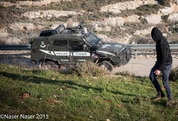
Israeli soldiers shot and injured, Friday, four Palestinians during clashes near the Ofer Israeli detention center and military base, built on Palestinian lands in Betunia and Rafat towns, in the central West Bank district of Ramallah.
The soldiers assaulted dozens of Palestinians, who marched on Friday afternoon, towards the detention center, and fired dozens of live rounds, rubber-coated steel bullets and gas bombs, while local youths hurled stones and empty bottles on them.
Medical sources said a young man was shot with a live round in the abdomen, suffering a serious injury, and three others were shot with rubber-coated steel bullets, while dozens suffered the effects of tear gas inhalation.
The soldiers also fired many gas bombs directly hitting a number of homes, causing many families to suffer the effects of tear gas inhalation.
In addition, several journalists suffered the effects of tear gas inhalation after the soldiers fired gas bombs on them, directly after the army vehicles left the Ofer prison.
The soldiers assaulted dozens of Palestinians, who marched on Friday afternoon, towards the detention center, and fired dozens of live rounds, rubber-coated steel bullets and gas bombs, while local youths hurled stones and empty bottles on them.
Medical sources said a young man was shot with a live round in the abdomen, suffering a serious injury, and three others were shot with rubber-coated steel bullets, while dozens suffered the effects of tear gas inhalation.
The soldiers also fired many gas bombs directly hitting a number of homes, causing many families to suffer the effects of tear gas inhalation.
In addition, several journalists suffered the effects of tear gas inhalation after the soldiers fired gas bombs on them, directly after the army vehicles left the Ofer prison.
12 feb 2016
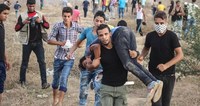
At least five Palestinian youths were injured Friday afternoon after Israeli Occupation Forces (IOF) opened their machinegun fire at a group of youths east of al-Bureij refugee camp in central Gaza Strip.
Spokesman for the Health Ministry Ashraf al-Qudra said that four gunfire injuries were reported during the clashes while a 38-year-old man was directly hit in his face by a tear gas bomb.
The injured man was transferred to Shuhada al-Aqsa hospital in a very critical condition, the PIC news reporter said.
Since early October, Gaza youths have weekly organized peaceful marches in support of Jerusalem Intifada in the occupied West Bank and Jerusalem, which was sparked by a spate of attacks by Israelis against Palestinians and their holy shrines.
Spokesman for the Health Ministry Ashraf al-Qudra said that four gunfire injuries were reported during the clashes while a 38-year-old man was directly hit in his face by a tear gas bomb.
The injured man was transferred to Shuhada al-Aqsa hospital in a very critical condition, the PIC news reporter said.
Since early October, Gaza youths have weekly organized peaceful marches in support of Jerusalem Intifada in the occupied West Bank and Jerusalem, which was sparked by a spate of attacks by Israelis against Palestinians and their holy shrines.
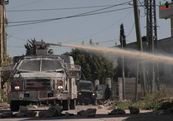
Several Palestinians have been injured, Friday, after Israeli soldiers used excessive force against the weekly protest in Kafr Qaddoum town, east of the northern West Bank city of Qalqilia.
The Popular Committee against the Wall and Colonies in Kafr Qaddoum said the Palestinians marched from the center of the village, demanding the army to reopen the main road, that was blockaded more than 13 years ago, before the soldiers assaulted them.
Coordinator of the Popular Committee Morad Eshteiwy said the soldiers invaded the town, accompanied by several bulldozers and armored vehicles, and fired dozens of gas bombs and concussion grenades.
Eshteiwy added that the soldiers also sprayed the protesters, and many homes, with waste-water mixed with chemicals, and fired many gas bombs, causing several mild injuries.
The soldiers also detained a cameraman, working for the WAFA Palestinian News Agency, identified as Ayman Noubani, 24, and another cameraman, identified as Mohammad Torabi, and only released them after the protest ended, several hours later.
The Popular Committee against the Wall and Colonies in Kafr Qaddoum said the Palestinians marched from the center of the village, demanding the army to reopen the main road, that was blockaded more than 13 years ago, before the soldiers assaulted them.
Coordinator of the Popular Committee Morad Eshteiwy said the soldiers invaded the town, accompanied by several bulldozers and armored vehicles, and fired dozens of gas bombs and concussion grenades.
Eshteiwy added that the soldiers also sprayed the protesters, and many homes, with waste-water mixed with chemicals, and fired many gas bombs, causing several mild injuries.
The soldiers also detained a cameraman, working for the WAFA Palestinian News Agency, identified as Ayman Noubani, 24, and another cameraman, identified as Mohammad Torabi, and only released them after the protest ended, several hours later.
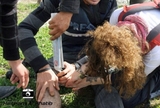
Army Targets Journalists Near Ramallah, Injures A Young Man In Bethlehem
Israeli soldiers attacked, Friday, the weekly nonviolent protest against the Annexation Wall and Colonies, in Ni’lin village, west of the central West Bank city of Ramallah, wounding many Palestinians, including a young man, who suffered a serious injury, after the soldiers shot him with a rubber-coated steel bullet in his head.
Medical sources said the soldiers shot the young man directly in his head, causing him a very serious injury, before local medics transferred him to a hospital, where he was admitted to the Intensive Care Unit.
The soldiers also shot three other young men, while dozens of Palestinians suffered the effects of tear gas inhalation.
The Popular Committee against the Wall and Colonies in Ni’lin said this week’s nonviolent protest comes in solidarity with hunger striking detainee, Journalist Mohammad al-Qeeq, who started his hunger strike 80 days ago, and against the ongoing illegal Israeli occupation, colonies and constant violations.
Also on Friday, the soldiers attacked the weekly nonviolent protest in Bil’in village, near the central West Bank city of Ramallah, causing dozens to suffer the effects of tear gas inhalation.
In related news, the soldiers assaulted many Palestinian protesters close to the Ofer Israeli prison, near Ramallah, and fired several gas bombs on them.
Media sources said the journalists were far from confrontations that were taking place between the soldiers and local youths, but the army deliberately targeted them to force him away, causing many of them to suffer the effects of tear gas inhalation.
The soldiers also fired dozens of rubber-coated steel bullets, gas bombs and concussion grenades on the protesters.
In the Bethlehem district, the soldiers shot a young man, with a live round in his arm, during clashes with local youths, after the army invaded Um Rokba area, in al-Khader town, south of Bethlehem.
Local medics moved the wounded young man to the Beit Jala government-run hospital, suffering a moderate-but-stable injury.
Israeli soldiers attacked, Friday, the weekly nonviolent protest against the Annexation Wall and Colonies, in Ni’lin village, west of the central West Bank city of Ramallah, wounding many Palestinians, including a young man, who suffered a serious injury, after the soldiers shot him with a rubber-coated steel bullet in his head.
Medical sources said the soldiers shot the young man directly in his head, causing him a very serious injury, before local medics transferred him to a hospital, where he was admitted to the Intensive Care Unit.
The soldiers also shot three other young men, while dozens of Palestinians suffered the effects of tear gas inhalation.
The Popular Committee against the Wall and Colonies in Ni’lin said this week’s nonviolent protest comes in solidarity with hunger striking detainee, Journalist Mohammad al-Qeeq, who started his hunger strike 80 days ago, and against the ongoing illegal Israeli occupation, colonies and constant violations.
Also on Friday, the soldiers attacked the weekly nonviolent protest in Bil’in village, near the central West Bank city of Ramallah, causing dozens to suffer the effects of tear gas inhalation.
In related news, the soldiers assaulted many Palestinian protesters close to the Ofer Israeli prison, near Ramallah, and fired several gas bombs on them.
Media sources said the journalists were far from confrontations that were taking place between the soldiers and local youths, but the army deliberately targeted them to force him away, causing many of them to suffer the effects of tear gas inhalation.
The soldiers also fired dozens of rubber-coated steel bullets, gas bombs and concussion grenades on the protesters.
In the Bethlehem district, the soldiers shot a young man, with a live round in his arm, during clashes with local youths, after the army invaded Um Rokba area, in al-Khader town, south of Bethlehem.
Local medics moved the wounded young man to the Beit Jala government-run hospital, suffering a moderate-but-stable injury.
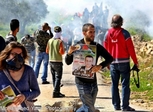
Israeli soldiers attacked, Friday, the weekly nonviolent protest against the Annexation Wall and colonies, held by Palestinian, Israeli and international peace activists, in Bil’in village, near the central West Bank city of Ramallah, causing dozens to suffer the effects of tear gas inhalation.
Coordinator of the Popular Committee against the Wall and Colonies in Bil’in, Abdullah Abu Rahma, said the protesters marched from the center of the village, carrying Palestinian flags and pictures of hunger striking detainee, journalist Mohammad al-Qeeq, while chanting for the release of all political prisoners, and the liberation of Palestine.
Coordinator of the Popular Committee against the Wall and Colonies in Bil’in, Abdullah Abu Rahma, said the protesters marched from the center of the village, carrying Palestinian flags and pictures of hunger striking detainee, journalist Mohammad al-Qeeq, while chanting for the release of all political prisoners, and the liberation of Palestine.
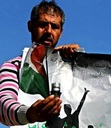
The soldiers started firing gas bombs and concussion grenades on the nonviolent protesters, causing scores to suffer the effects of tear gas inhalation.
Abu Rahma stated that the soldiers attacked the protesters near the old section of the Annexation Wall, and near the western entrance of the village, and fired many rubber-coated steel bullets, concussion grenades and gas bombs, in addition to firing a new type of gas bombs that can reach a distance of more than 1000 meters.
He called for prosecuting Israel for its ongoing crimes against the Palestinians, land theft, assaults and violations, in addition to the nightly invasions into the occupied territories, and the constant abductions, violent searches of homes, and property.
Abu Rahma stated that the soldiers attacked the protesters near the old section of the Annexation Wall, and near the western entrance of the village, and fired many rubber-coated steel bullets, concussion grenades and gas bombs, in addition to firing a new type of gas bombs that can reach a distance of more than 1000 meters.
He called for prosecuting Israel for its ongoing crimes against the Palestinians, land theft, assaults and violations, in addition to the nightly invasions into the occupied territories, and the constant abductions, violent searches of homes, and property.
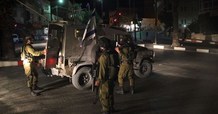
The Israeli occupation forces (IOF) at dawn Friday stormed and patrolled the neighborhoods of Ramallah and al-Bireh cities, without making arrests.
IOF patrol vehicles also invaded Deir Ballut town, west of Salfit city, according to local sources. The sources told the Palestinian Information Center (PIC) that Israeli soldiers raided and searched several homes during their campaigns in those areas at the pretext of looking for weapons.
The sources affirmed that the invading troops did not arrest any Palestinian as they usually did in previous campaigns.
IOF patrol vehicles also invaded Deir Ballut town, west of Salfit city, according to local sources. The sources told the Palestinian Information Center (PIC) that Israeli soldiers raided and searched several homes during their campaigns in those areas at the pretext of looking for weapons.
The sources affirmed that the invading troops did not arrest any Palestinian as they usually did in previous campaigns.

The Israeli occupation forces (IOF) on Friday morning opened fire at Palestinian shepherds and farmers in a border area south of the Gaza Strip.
Eyewitnesses said that Israeli soldiers at a military border post opened fire at Palestinian citizens working lands and grazing cattle east of Rafah area. Luckily, no one was injured in the gunfire attack.
The IOF opens fire at Palestinian farmers almost on a daily basis, and has caused injuries to several of them in previous incidents.
Eyewitnesses said that Israeli soldiers at a military border post opened fire at Palestinian citizens working lands and grazing cattle east of Rafah area. Luckily, no one was injured in the gunfire attack.
The IOF opens fire at Palestinian farmers almost on a daily basis, and has caused injuries to several of them in previous incidents.
